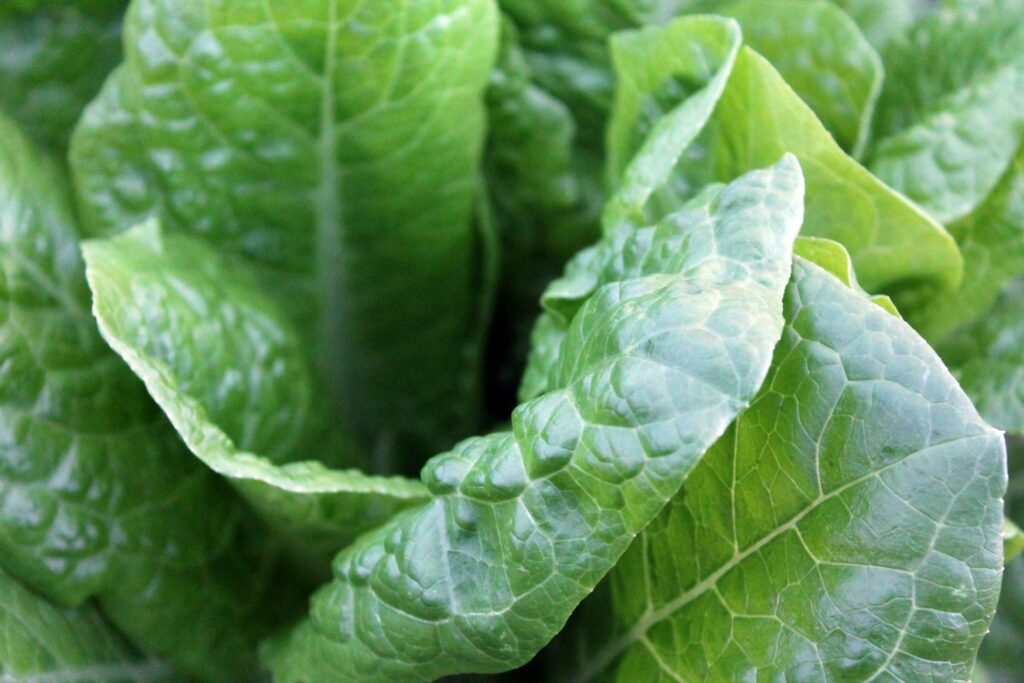Hey there! This post may contain affiliate links, meaning we get a small commission if you make a purchase through our links at no cost to you. I greatly appreciate your support! For more information please check our Disclosure Page.
In recent times, a lot of people have been opting for organic dairy products to meet their nutritional needs. They are made from livestock reared on organic farms without the use of growth hormones or antibiotics (1). The livestock are fed organic feed during their development. Organic dairy products are not only delicious, but they are also nutrient-rich and can help improve your health.
What are organic dairy products?
An organic dairy product is a type of dairy product that is produced following particular organic farming and production regulations or standards. These standards are designed to promote sustainability, animal welfare, and the health of consumers.
For instance, organic dairy livestock are not given antibiotics or synthetic hormones like rBGH (recombinant bovine growth hormone), or other synthetic additives.
Benefits of Consuming Organic Dairy Products
Consuming organic dairy products can offer several health benefits. To start with, they are free from synthetic fertilizers and pesticides. You can lessen your exposure to these potentially toxic compounds by making an organic food choice.
Furthermore, they are richer in various nutrients, such as antioxidants, vitamin E, and omega-3 fatty acids. These nutrients are necessary for sustaining immunological function and enhancing general health.
In addition, a lot of organic dairy products come from livestock that have access to natural pasture. Because of this natural diet, the milk has higher concentrations of healthy elements like omega-3 fatty acids and conjugated linoleic acid (CLA).
Again, these products are not only more nutrient-dense but also more environmentally friendly. Animal welfare is given priority in organic farming practices, which also support biodiversity and shield the environment from pollution and degraded soil.
Differences Between Conventional and Organic Dairy Products
There are major differences between conventional and organic dairy products. First, conventional dairy products are produced from livestock that are usually treated with growth hormones and antibiotics.
These compounds may have detrimental impacts on people’s health. Conversely, organic dairy products are made from milk that comes from cows that are not treated with growth hormones or antibiotics. This guarantees you’re taking milk devoid of such potentially toxic chemicals.
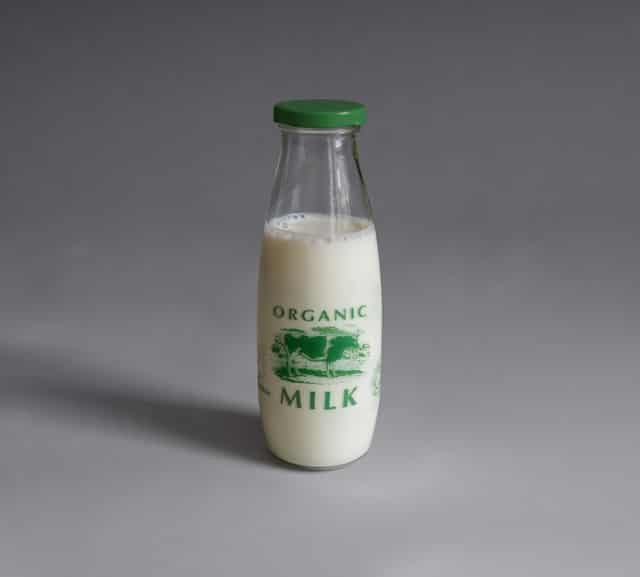
Fig. 1: Organic milk (Pixabay)
Second, conventional dairy farms usually apply synthetic fertilizers and pesticides on their crops, which can pollute the water, soil, and air. On the other hand, organic dairy farms do not employ these substances, which results in more environmentally friendly dairy products.
In terms of flavor, a number of individuals find that organic dairy products have more authentic and richer flavor when compared to conventional dairy products. This is due to the fact that organic dairy cows are usually fed a natural diet of forage and grass, leading to more flavorful and improved quality milk.
The Importance of Choosing High-Quality Organic Dairy Products
When selecting organic dairy products, it is imperative to go for high-quality alternatives. High-quality products are produced using sustainable farming practices that prioritize the well-being of the livestock, the consumers, and the environment.
The milk used to make these items comes from livestock that were grown on organic farms and allowed access to pasture. Furthermore, high-quality dairy products undergo very little processing, which keeps their original aromas and minerals intact.
Selecting quality products will allow you to get the maximum nutritional value and the best flavor.
Top 10 Organic Dairy Products and Their Health Benefits
1. Organic Milk
Organic milk has become increasingly popular among health-conscious consumers, and for good reason. In contrast to conventional milk, organic milk is produced in compliance with particular guidelines that support environmental sustainability, animal welfare, and exceptional nutritional value.

Fig. 2: Organic milk (Pixabay)
Organic milk provides numerous advantages that make it an appealing choice for many individuals.
It is high in protein, calcium, and vitamin D, among other vital minerals. It can be used in a variety of recipes, from baked products to smoothies.
From its higher nutritional value to its environmental benefits and support for animal welfare, organic milk represents a holistic approach to dairy farming that aligns with many people’s values and health goals.
Consider making the switch to organic milk and enjoy the benefits it can bring to your health, your community, and the planet.
2. Organic Greek Yogurt
Greek yogurt has become increasingly popular in recent years, and with good reasons. Its rich, creamy texture and high protein content make it a favorite among health enthusiasts and food lovers alike.
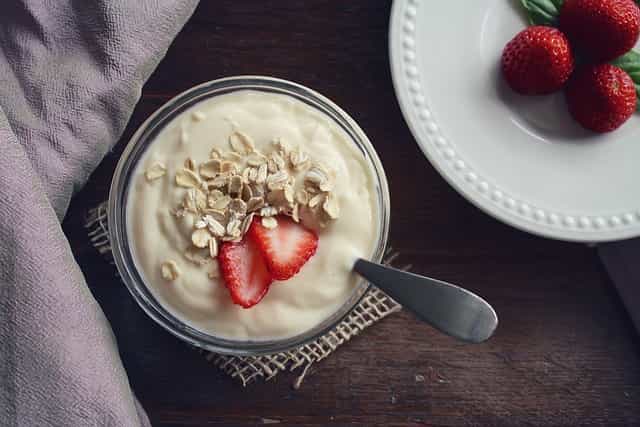
Fig. 3: Greek yogurt (Pixabay)
However, when you opt for organic Greek yoghurt, you are not only getting a delicious treat, you are also reaping many health and environmental benefits.
Made from strained organic milk, Greek yogurt is creamy, thick, and high in protein. Additionally, it is a fantastic source of probiotics, which strengthen the immune system and support digestive health.
Beyond concerns for one’s own health, buying organic promotes animal welfare and sustainable farming methods. You can enjoy a tasty, adaptable meal and help create a better world at the same time by include organic Greek yogurt in your diet.
Make the switch to organic Greek yogurt today and savor the benefits for yourself and the environment.
3. Organic Grass-Fed Butter
Organic grass-fed butter has become more and more popular in recent years, drawing acknowledgment from both culinary professionals and health aficionados.

Fig. 4: Grass-fed butter (Pixabay)
An excellent and nutrient-dense supplement to your diet, organic grass-fed butter is high in healthy fats and fat-soluble vitamins. It has greater concentrations of conjugated linoleic acid (CLA) and omega-3 fatty acids, both of which have been connected to a number of health advantages.
This kind of butter, derived from livestock that graze on organic pastures, provides a range of health benefits and superior taste.
Organic grass-fed butter is a nutritious, environmentally friendly, and delicious choice for your kitchen.
It stands out as a great choice for people looking to enhance their diet and promote sustainable agriculture because of its exceptional nutritional profile, moral agricultural methods, and adaptability in the kitchen.
By making the switch to organic grass-fed butter, you can enjoy better health benefits and a richer culinary experience while contributing to a more sustainable future.
4. Organic Cottage Cheese
Cottage cheese, renowned for its high protein content and adaptability, has long been a mainstay in many diets. Organic cottage cheese is a notable option for those seeking to make healthier and more environmentally responsible dietary choices.

Fig. 5: Cheese (Pexels)
Produced from organically raised livestock and processed without synthetic additives, organic cottage cheese provides many benefits.
A versatile nourishment that can be eaten on its own or used in cooking, organic cottage cheese is high in protein and low in fat. It is also a good source of other important minerals, such as calcium.
From its high protein content and essential nutrients to its support for sustainable farming methods and animal welfare, organic cottage cheese is a wholesome addition to any diet.
By opting for organic, you can enjoy a delicious, clean source of nutrition while contributing to a healthier planet. Make organic cottage cheese a regular part of your diet and savor the benefits it offers.
5. Organic Artisanal Cheese
Cheese enthusiasts are aware that not all cheeses are made equally. Organic artisanal cheese is distinguished from the wide variety of cheeses on the market by its better quality, remarkable flavor, and environmentally friendly manufacturing practices.
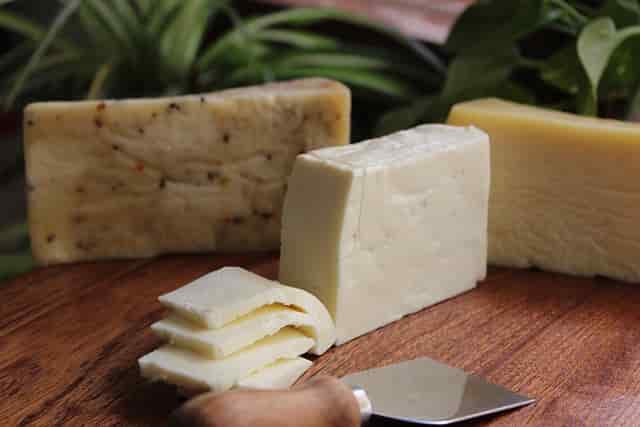
Fig. 6: Artisanal cheese (Pixabay)
Organic artisanal cheeses come in a variety of flavors and textures, ranging from tangy Cheddar to creamy Brie. They are made with traditional techniques and aged to perfection, making them a very indulgent treat.
Organic artisanal cheese provides a delightful combination of superior taste, nutritional benefits, and ethical production practices. By opting for organic artisanal cheese, you support sustainable agriculture, animal welfare, and traditional cheese-making practices.
Whether you’re a cheese connoisseur or simply looking to enhance your culinary experiences, organic artisanal cheese is a worthy addition to your diet. Savor the delicious flavors and the sense of calm that comes with choosing a more sustainable, healthier option.
6. Organic Kefir
Organic kefir is a fermented milk drink made from cow, goat, or sheep milk and kefir grains. These grains are a symbiotic culture of bacteria and yeast (SCOBY).

Fig. 7: Kefir (Pexels)
Packed full of probiotics, organic kefir is a fermented milk beverage that tastes similar to yogurt. It is renowned for having a creamy texture and tangy flavor, which makes it a refreshing and stomach-friendly beverage.
It is a delicious and nutritious addition to any diet, providing many health benefits thanks to its rich probiotic content and essential nutrients.
By opting for organic kefir, you support sustainable farming practices and animal welfare while enhancing your own well-being.
Organic kefir is a flexible and health-promoting option that is worthy of a spot in your kitchen, whether it is consumed on its own or combined with your favorite dishes.
7. Organic Cream Cheese
Organic cream cheese is a delicious, versatile dairy product that can elevate both sweet and savory dishes. It is made from the milk and cream of organically raised livestock and a great source of protein and calcium.

Fig. 8: Cream cheese (Unsplash)
By opting for organic cream cheese, you can enjoy a richer, more natural flavor while contributing to a healthier planet and better animal welfare.
Whether spread on your morning bagel, used in your favorite recipes, or enjoyed as a creamy dip, organic cream cheese is a delightful addition to any diet. Make the switch to organic and savor the difference in every bite.
8. Organic Sour Cream
Organic sour cream is a beloved staple in many kitchens, known for its rich, tangy flavor and creamy texture.
It gives your dishes a tangy and creamy touch, whether it’s used as a topping for baked potatoes or as a foundation for dips and salads. It is created from organic cream that has undergone lactic acid bacteria fermentation.
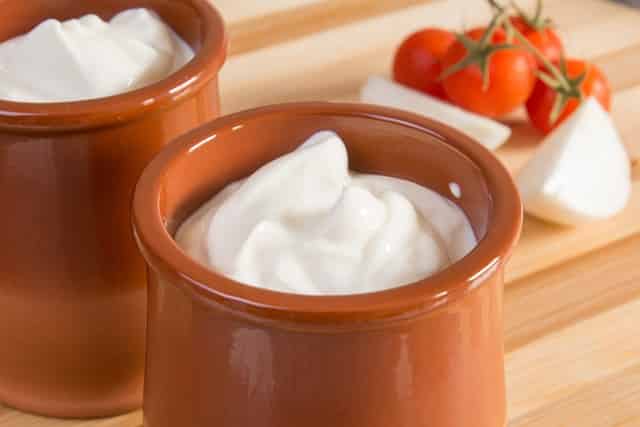
Fig. 9: Sour cream (Pixabay)
By opting for organic sour cream, you support sustainable farming methods and animal welfare while enjoying a product free from toxic additives and preservatives.
Whether you’re topping your favorite foods, baking, or creating creamy dips and sauces, organic sour cream is a versatile and healthful choice that can elevate your culinary creations.
Make the transition to this dairy product and enjoy the rich, creamy flavor with each bite.
9. Organic Ice Cream
Organic ice cream is made from ingredients produced without synthetic pesticides, fertilizers, antibiotics, or growth hormones.

Fig. 10: Ice cream (Pixabay)
Whether enjoyed on a hot summer day or as a cozy winter treat, ice cream is a dessert that brings joy to many. For individuals who value health, sustainability, and taste, organic ice cream is an excellent option.
Treat your sweet craving to naturally occurring ingredients in this dairy product. It is available in a range of flavors, from traditional vanilla to creative blends like honey lavender and salted caramel.
By opting for organic, you support sustainable farming methods, animal welfare, and your own health.
Whether enjoyed on its own, with toppings, or as part of a larger dessert, organic ice cream provides a rich, creamy, and authentic taste experience that you can feel good about.
Make the move to this dairy product to savor the smooth delight of a more sustainable and healthful dessert.
10. Organic Yogurt Drinks
Organic yogurt drinks are quickly becoming a popular choice for individuals who are seeking a delicious and nutritious way to stay healthy.

Fig. 11: Yogurt drinks (Pixabay)
These drinks are ideal for people who lead busy lives because they mix the creamy richness of yogurt with the practicality of a drinkable format.
They are often flavored with organic fruits and natural sweeteners, giving a tasty and healthy alternative to sugary beverages.
Packed with natural ingredients, probiotics, and essential nutrients, these drinks provide many health benefits while promoting animal welfare and environmental sustainability.
Whether taken on their own, in smoothies, or as part of your favorite recipes, organic yogurt drinks are a versatile and healthful addition to any regimen.
Health Benefits of Each Organic Dairy Product
Every organic dairy product has different health advantages:
- Organic milk is rich in vitamin D and calcium, which are important for strong teeth and bones.
- Yogurt has probiotics that aid in digestion and maintaining a healthy gut.
- Cheese is an excellent source of calcium and protein, which are essential for bone and muscle health.
- Butter offers healthy fats and fat-soluble vitamins that are important for hormone production and brain function.
- Ice cream, although a treat, can still offer some protein and calcium, and boost your mood.
- Kefir can fortify the immune system and support gastrointestinal health.
- Cottage cheese is a fantastic choice for managing weight and promoting muscle repair because it is rich in protein and low in fat.
- Sour cream adds flavor to dishes and contains some beneficial probiotics.
- Greek yogurt has a lot of protein, which is good for repairing muscles and controlling weight.
- Cream cheese is a good source of vitamin A, which is essential for eye and skin health.
How to Incorporate Organic Dairy Products into Your Diet
It is surprisingly easy to include these products in your diet. Start by substituting organic dairy products for regular dairy in your favorite recipes.
For instance, use organic Greek yogurt as a topping for your morning granola or swap out conventional butter for organic grass-fed butter when cooking.
These products are also delicious as stand-alone snacks. Scoop up some organic ice cream for a sweet treat or grab a package of cottage cheese for a quick and high-protein snack. The options are countless!
Where to Find and Purchase Organic Dairy Products
Organic dairy products can be found in different places, including organic grocery stores, health food stores, and online platforms.
A large variety of these products are also available at many of the local farmers’ markets. Look for certificates like the USDA Organic label, which guarantees that the products fulfill the necessary organic requirements when buying them.
Also, reading product labels can help you find out the source and quality of the product you are buying.
Organic Dairy Product Recipes and Cooking Ideas
It can be tasty and nourishing to include organic dairy products in your diet on a regular basis. To get you started, consider these few recipe suggestions:
- Creamy Greek Yogurt Smoothie: For a nourishing and revitalizing smoothie, blend organic Greek yogurt with your preferred fruits, a small amount of organic milk, and a sprinkle of honey.

Fig. 12: Yogurt smoothie (Pexels)
- Grilled Cheese with Organic Artisanal Cheese: Add some slices of organic artisanal cheese to your grilled cheese sandwich to make it even better. Combine it with a bowl of organic tomato soup to create a filling and comforting dinner.
- Organic Butter Roasted Vegetables: Combine your preferred organic veggies with melted organic grass-fed butter, and sprinkle with salt and pepper. Roasting them in the oven until they get golden and caramelized makes a tasty and nutritious side dish.
- Organic Yogurt Parfait: For a simple and wholesome breakfast or snack, top organic Greek yogurt with fresh berries, oats, and a drizzle of organic honey.
Organic Dairy Farming Practices and Sustainability
Organic dairy farming methods often prioritize animal welfare and environmental protection. Organic cows are raised in open pastures, where they have access to natural grazing, clean water, and fresh air. Unlike conventional dairy production, they are not exposed to crowded and unhygienic conditions.
Moreover, organic dairy production supports sustainable agriculture by limiting the application of synthetic pesticides and fertilizers.
This lessens water pollution, maintains biodiversity, and safeguards the quality of the soil. You can contribute to a more ecologically friendly and sustainable food system by opting for organic dairy products.
Common Misconceptions About Organic Dairy Products
It’s important to dispel some common misconceptions about organic dairy products. One of the most common misconceptions is that organic dairy products are only for vegans or lactose-intolerant individuals.
Actually, anyone can enjoy organic dairy products as part of a balanced diet.
Another myth is that organic dairy products are considerably more expensive as compared to their conventional counterparts.
Although there may be a small price difference for organic products, the higher quality, greater nutritional content, and sustainability of organic dairy products frequently outweigh this price difference.
Conclusion
Including organic dairy products in your diet is a tasty and easy approach to improving your health in general. There are many reasons for opting for organic dairy products, ranging from the health advantages to the environmentally friendly agricultural methods.
Why not discover the realm of organic dairy and learn about the diverse array of tastes and textures that are accessible? There is an organic alternative for everyone, whether you prefer cool milk, rich cheeses, or creamy yogurts.
Embrace the goodness of excellent organic food and all of nature’s blessings that accompany it. Both your health and your taste buds will appreciate it.
References
1. Hamadani, H., and A. A. Khan. “Organic dairy farming-an overview.” (2015): 4-9.

